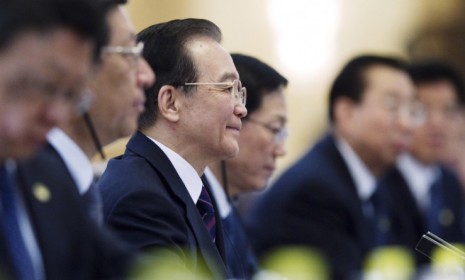Why China should bail out the eurozone: 3 theories
The EU is practically begging for a financial lifeline from the world's most populous nation. China isn't eager to get involved — but maybe it should be

A free daily email with the biggest news stories of the day – and the best features from TheWeek.com
You are now subscribed
Your newsletter sign-up was successful
As the European debt crisis lurches into its third year, super-rich China finds itself with cash-strapped European suitors lining up on its doorstep. With $3.2 trillion in foreign exchange reserves, China appears to be in prime position to provide a lifeline to the debt-beleaguered continent. Prime Minister Wen Jiabao recently pledged China's aid, but his vague promise didn't entail any firm commitments, and many Chinese officials are still wary of exposing the country to risky bonds from Greece and other debt-burdened European nations. But maybe they should think again. Here, three reasons why China would be wise to rescue Europe:
1. If Europe falters, it would cripple China's economy
China's economic growth could be cut in half if the eurozone enters a recession, warns the International Monetary Fund. With annual trade valued at 560 billion euros ($730 billion), Europe is China's largest trading partner. In addition, Chinese business investments in Europe more than doubled from 2010 to 2011. Propping up Europe now could forestall a far-more-expensive economic collapse down the road.
The Week
Escape your echo chamber. Get the facts behind the news, plus analysis from multiple perspectives.

Sign up for The Week's Free Newsletters
From our morning news briefing to a weekly Good News Newsletter, get the best of The Week delivered directly to your inbox.
From our morning news briefing to a weekly Good News Newsletter, get the best of The Week delivered directly to your inbox.
2. China could gain political leverage over the West
In "desperate need of financial support," Europe might be willing to make big political concessions to China, writes Thomas H. Naylor at CounterPunch. For instance, as a prerequisite for aid, China demand that the West quit threatening Iran over its nuclear program. Such a move would "effectively checkmate" the U.S. and Israel. "All of this makes Washington very nervous," and the U.S. "does not relish the thought of the EU becoming financially dependent on Beijing."
3. China could also bolster its clout at the IMF
China should "pony up," writes Wayne Arnold at Reuters, but buying European bonds directly is "too risky." Instead, China should funnel its aid through the IMF — and thereby earn a "bigger role at the world's currency watchdog." The U.S. dollar is still the world's reserve currency, which leaves China vulnerable to the whims of U.S. monetary policy. China views the IMF as the "best counterbalance to such tides," and winning more influence at the powerful organization ought to be a "no-brainer."
A free daily email with the biggest news stories of the day – and the best features from TheWeek.com
-
 Labor secretary’s husband barred amid assault probe
Labor secretary’s husband barred amid assault probeSpeed Read Shawn DeRemer, the husband of Labor Secretary Lori Chavez-DeRemer, has been accused of sexual assault
-
 Trump touts pledges at 1st Board of Peace meeting
Trump touts pledges at 1st Board of Peace meetingSpeed Read At the inaugural meeting, the president announced nine countries have agreed to pledge a combined $7 billion for a Gaza relief package
-
 Britain’s ex-Prince Andrew arrested over Epstein ties
Britain’s ex-Prince Andrew arrested over Epstein tiesSpeed Read The younger brother of King Charles III has not yet been charged